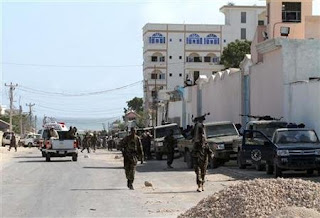MOGADISHU (Reuters) - Islamist suicide bombers attacked the hotel where Somalia's president was giving a news conference on Wednesday, killing eight people and sending reporters diving for cover.
President Hassan Sheikh Mohamud - just two days into his job - and the visiting Kenyan foreign minister were unhurt in the attack claimed by Somalia's al Shabaab rebels.
The first explosion struck shortly after 2 p.m. (1100 GMT) as Kenya's Sam Ongeri started to speak. Volleys of gunshots erupted as local and foreign journalists ducked behind pillars, velvet red chairs and cameras.
Mohamud, who had been staying at the hotel since being elected on Monday, was unfazed and Ongeri continued his speech, saying: "I believe this is the price of peace."
Seven-and-a-half minutes later, a second explosion erupted.
The attacks - on the newly built Jazeera Palace hotel, near the airport and one of the securest places in Mogadishu - underscore the security challenges facing Mohamud, whose election was hailed by many as a way to end 20 years of violent anarchy.
"We were behind the Mogadishu hotel blasts. It was a well planned Mujahideen operation," Sheikh Abdiasis Abu Musab, a spokesman for al Shabaab's military operations, told Reuters.
A journalist accompanying Ongeri said she had seen "pieces of meat flying all over the place" after the first blast.
"Then I saw a second guy shooting as he stormed towards the hotel," said Jamila Mohammed, who was outside the hotel when the assailants struck.
"PRIORITY 1, 2, 3: SECURITY"
A Reuters witness said the severed leg of one of the suicide bombers wearing a white sneaker could be seen just outside the hotel's gate where African Union armoured vehicles were parked, at least one of which was splattered with blood.
A severed head lay in a large crater in the road dozens of metres (yards) away from the hotel, which overlooks the Indian Ocean.
Mohamud's election by Somali lawmakers on Monday was hailed by his supporters as a vote for change in the war-ridden Horn of Africa country that has lacked effective central government since 1991.
Although he is relatively new to politics, the former academic faces old problems: a stubborn Islamist insurgency, acrimonious clan politics, rampant corruption and maritime piracy.
"First and foremost we will address the security issue here in Somalia ... Our priority number one, our priority number two and priority number three is security," Mohamud said moments after the blasts to cheers in the audience.
The A.U. Peacekeeping force AMISOM said a third attacker was shot dead as he attempted to scale the hotel's courtyard.
His body was lying in a pool of blood where three A.U vehicles were parked just outside the hotel.
"Shabaab are very well-organised. Look at their timing. These people, they are everywhere," said Mohamed Maie, a foreign ministry official, sitting in the lobby after the attack.
"When the hope and aspirations came, that's the time they wanted to destroy hope. You don't relax just because some people voted for a positive sign, it doesn't mean everything is honey."
SHABAAB TO CONTINUE JIHAD
Al Shabaab - al Qaeda-linked militants - said the explosions had killed four members of the security forces. A Somali ambulance service worker said they had picked up the bodies of five government soldiers and two civilians.
"I could also see three dead African Union soldiers," the ambulance worker said. AMISOM said one soldier died and three were others wounded.
The airport compound is a major base for African Union peacekeepers and the surrounding area is considered one of the safest parts of the city.
On Tuesday, al Shabaab branded Mohamud a "traitor" and vowed to continue its jihad against a government it says serves only Western interests.
Kenya sent troops into Somalia in November to help crush the Islamist insurgency. Ongeri said Somalia could count on Kenya's support.
"The bomb blasts will change nothing at all. We are determined. We are there for the course and until that course has been achieved," Bogita Ongeri, a spokesman for Kenya Defence Forces, told Reuters. (Additional reporting by Abdi Sheikh and Feisal Omar in Mogadishu and Richard Lough and Drazen Jorgic in Nairobi; Writing by Richard Lough and Yara Bayoumy; Editing by Jon Boyle and Robin Pomeroy)




0 Comments